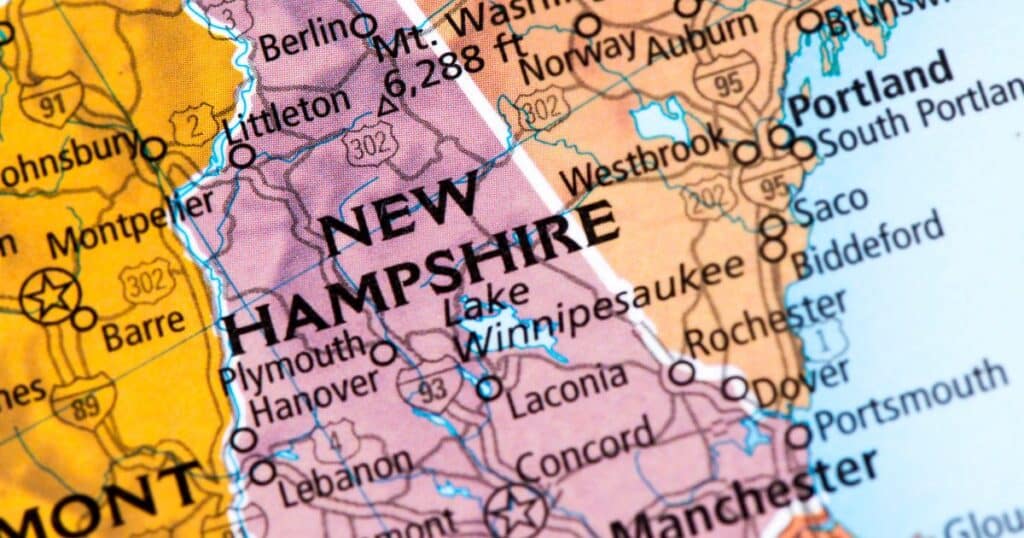New Hampshire, the last piece of the Northeastern puzzle without a framework for adult-use cannabis, is currently under the legislative microscope as a long-debated cannabis legalization bill inches closer to—or further from—reality. With a conservative governor at the helm, the road to regulation is riddled with challenges to design a model that fits both the state’s landscape and the voter’s will.
High Hopes in the House
The House of Representatives offered encouragement to advocates for legalization by passing bill HB 1633 last week, receiving a majority vote of 239-146. The bill, proposed by Republican State Representative Erica Layon, stands as a testament to the shifting sands of political will in the state.
The proposed legislation would legalize cannabis for adult use, allowing individuals over the age of 21 to possess up to four ounces of cannabis. The bill also paves the way for a regulated commercial market, with the New Hampshire Liquor Commission acting as the regulatory body.
Additionally, the bill proposes a cautious approach to retail outlet expansion by limiting the number of initial cannabis licenses to 15, with provisions in place for a gradual increase.
Opposition and Concerns on the Horizon
Amidst passing in the House, opposition to HB 1633 takes shape, aligning with recent developments in neighboring Virginia. Critics of the bill, including members who voted against its passage, echo the sentiments of Virginia Governor Youngkin’s veto of a similar adult-use cannabis bill.
Opponents argue that states that have proceeded with legalization face “adverse effects on children’s and adolescent’s health and safety, increased gang activity and violent crime, significant deterioration in mental health, decreased road safety, and significant costs associated with marijuana that far exceed tax revenue.”
They express concerns that legalization does not effectively combat the illicit market sales of cannabis, nor does it guarantee product safety. This faction believes that the potential negatives, particularly the endangerment to health and safety, do not outweigh the benefits of expanding access to cannabis, following what they describe as the “failed paths of other states.”
However, the most contentious aspect is the provision for state-controlled retail cannabis dispensaries, a concept that many legislators have found restrictive, but New Hampshire Governor Chris Sununu has called for it.
Senate’s Position and Governor’s Defense on Cannabis Legalization
However, the road ahead remains foggy, with the Senate and Governor Chris Sununu standing as gatekeepers to the bill’s passage. The Governor’s office made it clear that the current form of the legislation does not align with the Governor’s suggestions and focuses on developing a framework that prioritizes harm reduction and child safety.
While Governor Sununu has softened his stance on marijuana over the years, he continues to advocate for a state-run retail model, distinct from the House’s vision of “agency stores”.
Sununu has expressed a desire for a model where the state runs or franchises stores, allowing the government to control the appearance and pricing of products in each location.
This latest standoff has highlighted the diverging approaches between the House, the Senate, and the Governor, potentially threatening the bill’s future.
“Governor Sununu has been crystal clear about the framework needed for a legalization bill to earn his support, focusing on harm reduction and keeping it out of kids’ hands,” his office mentioned in remarks to local media WMUR following Thursday’s vote. “The legislation passed today doesn’t get us there but the Governor looks forward to working with the Senate to see if we can get it done.”
Statement from the office of @GovChrisSununu indicating he wants to see @TheNHSenate go to work on the cannabis legalization bill the @NHHouseofReps approved today rather than simply declare it DOA #NHPolitics #WMUR pic.twitter.com/SdBkWOKbq0
— Adam Sexton (@AdamSextonWMUR) April 11, 2024
Party Divided
“The bill that passed the House reflects the Governor’s guidelines as I understood them, until his last minute embrace of a franchise model,” Layon told Marijuana Moment last Friday. “I made dozens of attempts to meet with the Governor and his staff to get into the policy details, but the best meeting I achieved was a walk-and-talk with him through the halls of the Capitol.”
The situation has sparked an unexpected battle within the Republican party, with legislators like Rep. Erica Layon advocating for a free-market approach and others, including some in the Senate, echoing the Governor’s call for a more state-controlled system.
State Run Franchises?
Governor Sununu’s insistence on a state-run franchise model for the cannabis industry paints a picture of a tightly controlled, monopolistic approach to what could otherwise be a more diverse and competitive market.
By advocating for a system where the government dictates the appearance, operations, and pricing within cannabis dispensaries, it appears the Governor aims to rule the emerging industry with an iron fist. This approach raises several concerns, notable among them being the potential stifling of innovation and entrepreneurship within the sector.
The state’s overarching control over crucial elements like store aesthetics and product pricing could severely limit businesses’ ability to differentiate themselves, potentially leading to a homogenized market that lacks the vibrancy and diversity seen in states with more liberal regulations.
Furthermore, the prospect of government-determined pricing raises alarms about the state’s ability to remain responsive to market dynamics, potentially leading to inflated costs for consumers or, conversely, prices that do not cover production and operation costs, pushing businesses into financial distress.
This proposed model seems unstable, navigating an uncharted territory that could steer New Hampshire’s cannabis industry towards inefficiency and stagnation rather than growth and prosperity.

Can New Hampshire Find Common Ground On Cannabis Legalization?
Overall, New Hampshire’s journey to cannabis legalization faces legislative challenges. The House passed a bill that is unlikely to pass through the Senate unchanged. The Senate’s amendments will likely meet resistance in the House.
At the heart of the deadlock is a mismatch between the bill’s provisions and the Governor’s stance, who has veto power. This situation highlights the need for compromise to align the different priorities and visions for cannabis in New Hampshire.
New Hampshire is the only Northeast state without a legal adult-use cannabis program. This hesitation not only misses out on economic benefits but also drives residents to buy cannabis legally in neighboring states, costing New Hampshire valuable revenue.
The state should move quickly towards legalizing cannabis, finding compromises that serve the public interest, boost the economy, and make New Hampshire competitive in the regional cannabis market.
- Maryland Leads the Way in Cannabis Pardons, Setting an Example for Much-Needed Cannabis Reform
- Military Construction and Veterans Affairs Bill Amendments Could Change Medical Marijuana and MDMA-Assisted Therapy Options for Veterans
- Thailand’s U-Turn on Recreational Cannabis Use
- Chicago Police Department Revises Policy on Searches Based Solely on Marijuana Odor
- Ohio’s Senate Bill 56 Postponed, Leaving Details of Issue 2 Still Unresolved
- Sports Stars and Well Known Entertainers Join Forces Calling on Trump for Cannabis Reform














